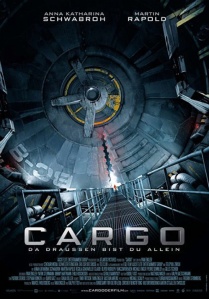 I recently wrote a review of the Swiss sci-fi film Cargo for It’s Just Movies. However, seeing as I didn’t want to include spoilers, I left out the references to Greek mythology that my inner Classics nerd couldn’t help but notice. So, I thought I’d use my personal blog to explore these references and their meanings.
I recently wrote a review of the Swiss sci-fi film Cargo for It’s Just Movies. However, seeing as I didn’t want to include spoilers, I left out the references to Greek mythology that my inner Classics nerd couldn’t help but notice. So, I thought I’d use my personal blog to explore these references and their meanings.
Spoilers ahead!
Directed by Ivan Engler and Ralph Etter, Cargo is set in a technologically advanced, post-apocalyptic world. Pollution has made Earth uninhabitable, forcing the majority of humankind to move to crowded space stations. However, for the fortunate few who can afford it, Rhea (a paradise planet light-years away from Earth) acts as an alternate home-world.
In order to earn enough money to move to Rhea and reunite with her family, Laura Portmann (Anna-Katharina Schwabroh) takes a job as a medic onboard the Kassandra, a massive cargo ship transporting goods to a distant space station. Mid-way through her shift out of hibernation, Laura discovers that there is something alive in the ship’s cargo bay (an area off-limits to the crew).
After a few character and plot twists, we learn that Rhea doesn’t exist (it’s actually a virtual reality), that Earth is in fact habitable again, and that the Kassandra is actually transporting thousands of human beings in deep hibernation to a space station where they will unknowingly spend the rest of their lives in the virtual reality of Rhea.
So, where does the Greek mythology come into play, you ask?
In Greek mythology, Rhea was the mother of the Olympian gods and the daughter of Uranus (sky) and Gaia (earth). After overthrowing their parents, Rhea and her husband Cronus became the rulers of the gods. However, paranoid that he would in turn be overcome by a child of his own, Cronus swallowed any child that Rhea bore him.
 Nevertheless, when Zeus was born, Rhea tricked Cronus by feeding him a rock, consequently leading to Zeus’ succession as king of the gods.
Nevertheless, when Zeus was born, Rhea tricked Cronus by feeding him a rock, consequently leading to Zeus’ succession as king of the gods.
In the film, Rhea is humanity’s last hope. It’s a new home that succeeds Earth in beauty and safety. And given the Titaness’ position as Earth’s (Gaia’s) offspring and successor, Rhea is an appropriate name for the new home-world of humanity. However, Rhea is also a lie – a digital creation that like the mythic Rhea, is deceitful and untrustworthy. Like Cronus, humanity is ultimately tricked by Rhea into believing a falsity, and by naming humanity’s utopian salvation after the Titaness, the film hints that the planet may not be the paradise it’s supposed to be.
The second reference to Greek mythology is the Kassandra.
According to Classical myth, Cassandra was given the gift of foresight by the god Apollo. However, after angering the god, Cassandra was cursed, ensuring that no one would ever believe her prophesies. Consequently, when Cassandra prophecized the defeat of Troy at the hands of the Greeks, no one believed her – leading to the fall of Troy and her own demise.
Similarly, as a member of the Kassandra, Laura also discovers a tragic truth that may not be taken seriously. Although she uses the Kassandra to broadcast her message to the rest humanity, the film ends abruptly without clearly illustrating whether people believe her. Afterall, just like the fall of Troy, the reality that Rhea is a virtual lie is a shocking truth that people may not want to believe. Like the Trojans, humanity may not want to accept the demise of their only remaining home-world. The film even goes so far as to suggest that some people would rather knowingly live in a digital falsity, as we see two crew members choose to enter Rhea.
So, does Laura’s broadcast ultimately change the future? Or like Cassandra, does Laura possess a truth that no one believes? The film doesn’t quite answer these questions clearly. However, by referencing the tragic myth of Cassandra, Cargo not only suggests that Laura’s efforts were in vain, but also that we would rather trust in a virtual reality than accept the truth.

